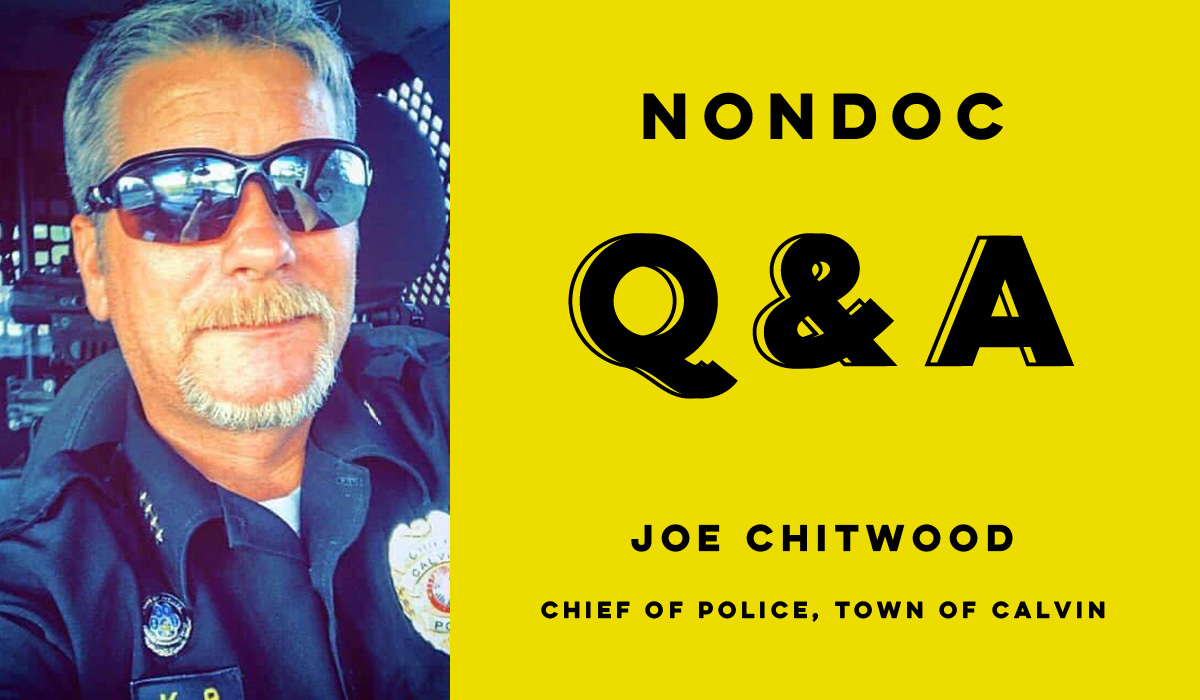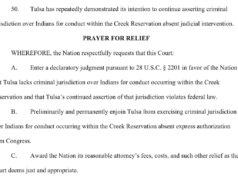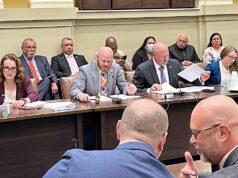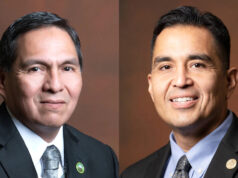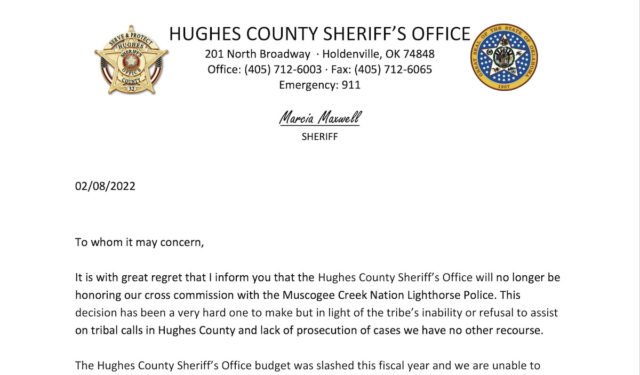

Since the July 2020 SCOTUS ruling in McGirt v. Oklahoma affirmed the Muscogee Nation as an Indian Country reservation and subsequent court decisions affirmed the Cherokee, Chickasaw, Choctaw, Seminole and Quapaw nations, tribal leaders have touted the importance of cross-deputization agreements among law enforcement agencies in eastern Oklahoma.
So far, the Muscogee Nation has established cross-deputization agreements with 63 different law enforcement agencies across the reservation, according to communications director Jason Salsman. Agencies cross-deputized to handle cases involving Muscogee citizens include the Tulsa County Sheriff’s Office, Jenks Police Department, Broken Arrow Police Department, Glenpool Police Department, Oklahoma Highway Patrol and the FBI, among others.
The McGirt ruling meant that only the federal government and the Muscogee Nation — not the state — have criminal jurisdiction over major crimes perpetrated by or against tribal citizens within Muscogee reservation boundaries. The situation has required greater communication, transference of calls and — in theory — cooperation between tribal and non-tribal law enforcement.
However, cross-deputization agreements are still not in place with the police departments of Henryetta or Okmulgee, two municipalities within the heart of the Muscogee Nation. On Tuesday, the Hughes County Sheriff’s Office also decided it could operate without a cross-deputization agreement with the Muscogee Nation.
In a letter she described to NonDoc as “a last resort,” Hughes County Sheriff Marcia Maxwell declared she would no longer be honoring the county’s cross-deputization agreement with the Muscogee Nation owing to concerns about their working relationship, particularly as it relates to the prosecution of alleged criminals.
“This decision has been a very hard one to make but in light of the tribe’s inability or refusal to assist on tribal calls in Hughes County and lack of prosecution of cases we have no other recourse,” Maxwell wrote in an unaddressed letter. “I feel that the MCN has done a great disservice to the people of Hughes County with the issues currently going [on] in the tribal court system or better yet, the lack there of.”
In her letter (embedded below), Maxwell references two “infuriating” cases that she said were not prosecuted by the Muscogee Nation, and she wrote that “there are many more documented cases where both native and non-native citizens have been victimized without any repercussions from tribal authorities.”
Asked about Maxwell’s letter saying she would no longer honor Hughes County’s cross-deputization arrangement with the Muscogee Nation, Salsman claimed the tribe had not been notified by the sheriff directly.
“Thank you for notifying us of this letter and Sheriff Maxwell’s complaints,” Salsman wrote in an email. “I’ve checked with Lighthorse Police, our Attorney General’s Office and Muscogee (Creek) Nation leadership, and this is the first anyone has heard of this letter or the issues she’s outlined. We are reviewing these serious allegations the sheriff outlines in the letter received by the media, but not by us.”
Salsman said he was not sure if Maxwell had contacted the Muscogee Nation directly with her letter or whether she had purposely excluded the tribe from it.
“I’m not sure if she’s mailed it directly to us or if she excluded us by design,” Salsman said. “A quick Google search popped up this story from Holdenville when Sheriff Maxwell sent an open letter rather than work directly with the local police chief. So, it could be the latter.”
‘We remain hopeful that we can have a good working relationship’
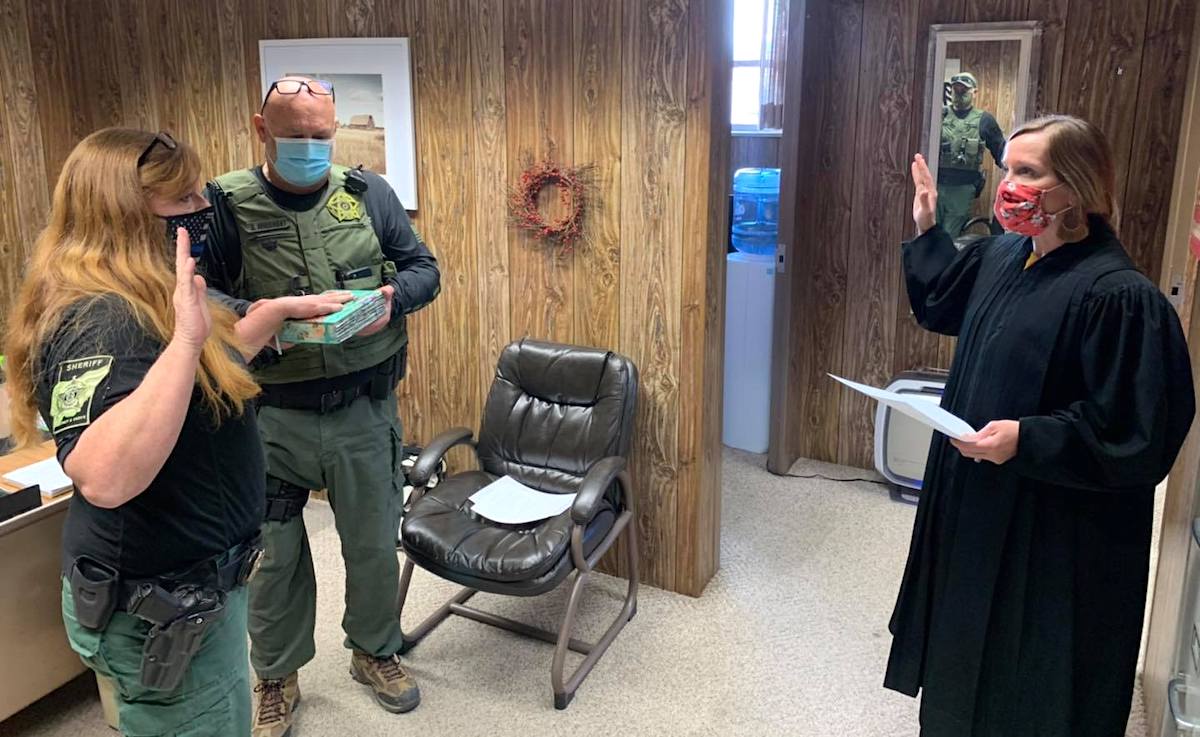
Maxwell told NonDoc that she emailed her letter to the tribe’s police department and Attorney General’s Office around 1 p.m. Tuesday. She said her frustrations had been mounting for months and culminated when she said Muscogee Nation officials left her and Hughes County District Attorney Paul Smith waiting “for two hours” at a scheduled meeting.
“Nobody from their office ever showed up, so I finally called them and just cancelled it,” Maxwell said, saying a similar situation had unfolded for a prior meeting. “I just want them to do their job, basically, and this was the only way I knew of. I mean, all of our other options didn’t work of trying to talk to them. It’s just a mess.”
Maxwell said she received a message from the Muscogee Nation’s Attorney General’s Office after she sent her letter, but she said late Thursday that she is waiting to return the phone call when Smith, the district attorney, can be with her.
Maxwell, whose agency recently had its budget cut owing to a dip in Hughes County sales tax receipts, said her frustrations have only been with the Muscogee Nation’s law enforcement entities.
“The Choctaw Nation is the south part of our county, so I know how good it can be because I’ve got them down there and they are great,” Maxwell said.
A licensed professional nurse who served as a Hughes County reserve deputy since 1996, Maxwell was elected sheriff in 2014. The northern portion of Hughes County lies within the southwest corner of the Muscogee Nation reservation and includes the cities of Holdenville and Wetumka. U.S. Census Bureau data indicates that 20.4 percent of Hughes County residents reported their race as only American Indian. Another 7.7 percent identified as being of two or more races.
“We remain hopeful that we can have a good working relationship with [the Muscogee Nation], but they’re going to have to step up to the plate and do something,” Maxwell said. “We can’t do all the work and then them not do anything and not prosecute the people we arrest.”
Salsman: ‘Underlying issues are more complicated’
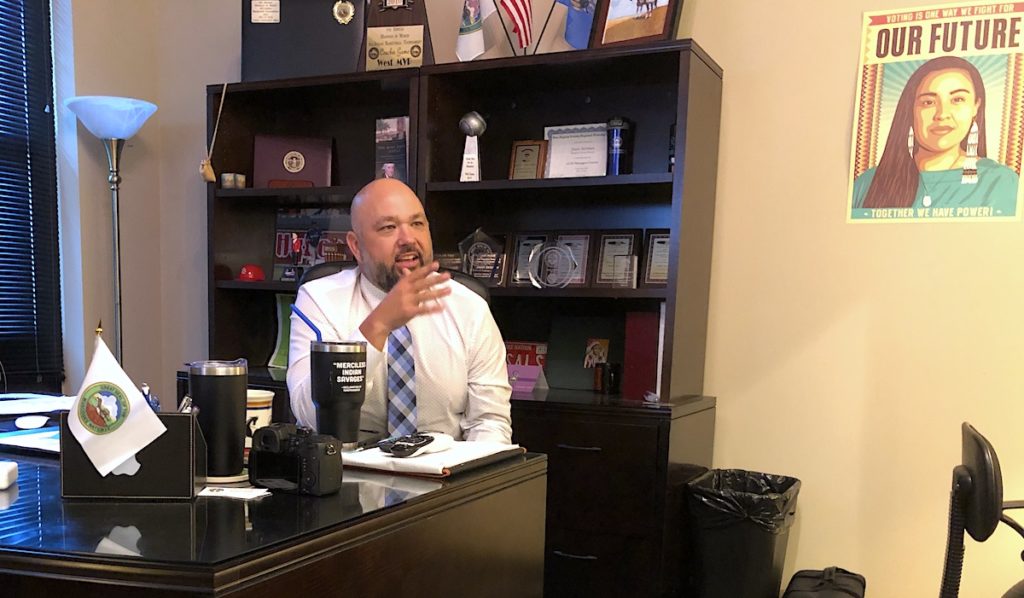
Salsman expressed disappointment with Maxwell’s decision to release a letter publicly, and he said acting Muscogee Nation Attorney General Kyle Haskins contacted Maxwell after receiving the letter from media.
“It is unfortunate that Sheriff Maxwell did not decide to first contact our Attorney General’s Office regarding these matters,” Salsman said. “We would have explained that with the cross-commission, or cross-deputization agreement we have had in place, our Lighthorse officers don’t need to respond when the sheriff’s officers are present. Likewise, the sheriff does not need her officers to be present in most circumstances to prosecute our cases.”
Salsman said Muscogee Nation law enforcement could identify the resolutions of the cases Maxwell referenced in her letter if she had provided the tribe with defendants’ names.
Salsman then gave a bulleted list of issues that could arise from ending the cross-commission agreement between the tribe and county:
• Only part of Hughes County is within our jurisdiction. These may not be cases originating within our jurisdiction.
• Dropping a cross-deputization agreement does not give the Hughes County (Sheriff’s Office) anything back. The county doesn’t suddenly regain jurisdiction over Indians.
• In fact, without a cross-deputization agreement, the sheriff has created a great risk for civil liability if they make an error in arresting an Indian. The “good faith” exception normally available to cross-deputized law enforcement officers is gone.
• Absent a cross-deputization agreement, any evidence the sheriff collects on a case where she doesn’t have jurisdiction may well be excluded from use as evidence in trial.
• The sheriff’s letter doesn’t identify if the alleged perpetrator(s) are Indian. It could be that they are non-Indian and we would not have jurisdiction in most instances.
Salsman said the Muscogee Nation looks forward to understanding the issues penned by Maxwell if everyone can just agree to meet and talk through the situation.
“While the sheriff’s letter seems straightforward, the motives and the underlying issues are more complicated,” Salsman said. “We look forward to a better understanding of both.”
Follow @NonDocMedia on:
Complications surrounding cross-deputization
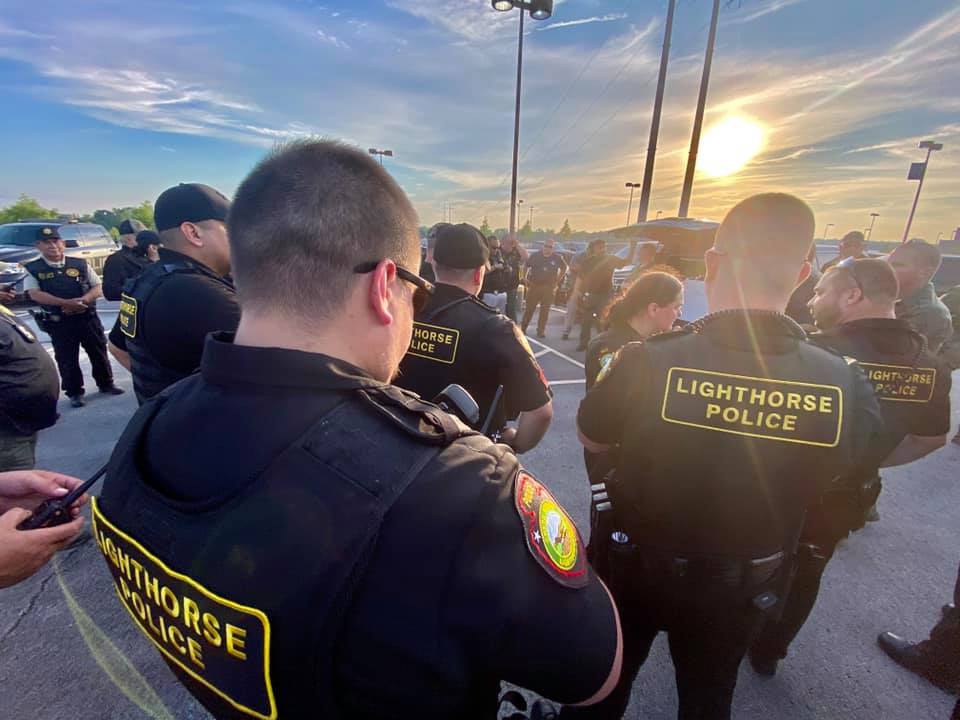
Cross commission or cross deputization agreements allow law enforcement personnel from both state and tribal entities to cooperate across jurisdictional lines, meaning either agency is permitted to arrest and detain native or non-native lawbreakers before sorting out which court system has rightful authority to consider charges. Many such agreements have been established for years, but the July 2020 U.S. Supreme Court decision in McGirt v. Oklahoma has made these agreements even more significant.
During his 2022 State of the State address Monday, Oklahoma Gov. Kevin Stitt said the jurisdictional puzzle “jeopardizes justice” and robs the state’s “authority to prosecute crimes.” On Thursday, Stitt released a statement supporting Maxwell.
“I fully support Sheriff Maxwell and our brave law enforcement officers across the state who put their lives on the line to protect their communities every single day,” Stitt said. “McGirt jeopardizes justice and I will continue to stand with victims and pledge to do everything I can to defend law and order in Oklahoma.”
Following Stitt’s address Monday, Muscogee Nation Chief David Hill spoke with NonDoc about some of the tension points between state and tribal officials surrounding the ruling, including public safety and cross-deputization agreements.
RELATED
Joe Chitwood talks K-9 training, ‘small-town policing’ in Indian Country by Tres Savage
“(On) public safety, we agree there, that’s No. 1 on our list as well,” Hill said. “As I’ve mentioned to [Stitt] before, all our law enforcement — everyone’s law enforcement — had to take the same oath to protect citizens. Even though we’re Muscogee Creek citizens, we’re still Oklahomans as well. That’s our No. 1 goal: to protect the citizens of Oklahoma.”
Hill then told of a recent meeting between his administration and law enforcement organizations across the Tulsa metro area.
“We’ve had several meetings through other municipalities to sit down and discuss. We had one a couple weeks ago, they understood. I even reached out to the Tulsa Sheriff’s Department, got my phone, got my number to discuss and they appreciated that we were reaching out to them. I mean, it’s a learning curve, but you know what? It’s nothing that can’t be fixed.”
In July 2021, NonDoc conducted a lengthy interview with Salsman, the Muscogee Nation’s communications director, and discussed the absence of cross-deputization agreements with the cities of Okmulgee and Henryetta.
“I think, on any agreement, both parties are going to look to what it does for them. Does it get us to a place where we can compromise and still not be left vulnerable, and we can compromise and move forward and everybody’s good? Or does one side think, ‘You know what, that doesn’t work for me.’ And then the other side says, ‘You know, I need something done here or there,'” Salsman said. “For whatever reason, they have problems that — what did I say, 62 other agencies, including Tulsa County sheriff, Glenpool Police Department, Oklahoma Highway Patrol, Federal Bureau of Investigation — these two agencies here close to home have something they can’t get over that all of those other ones are fine with.”
Read Sheriff Marcia Maxwell’s letter
